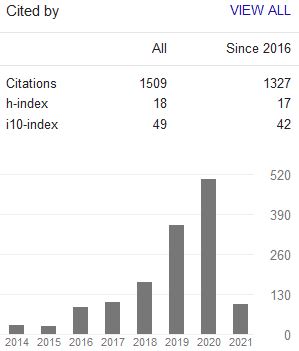MODERNIZING ISLAMIC EDUCATION IN THE MOST POPULATED MUSLIM WORLD
Abstract
Keywords
Full Text:
PDFReferences
Azra, Azyumardi.â€The Surau and the Early Reform Movements in Minangkabau,†Mizan 3, 2 (1990): 64-85.
----------. The Origins of Islamic Reformism in Southeast Asia. Crows Nest: Allen Unwin, 2001.
Badan Penelitian dan Pengembangan Pendidikan dan Kebudayaan, Sejarah Pendidikan Swasta di Indonesia (Pendidikan Muhammadiyah). Jakarta: Departemen Pendidikan dan Kebudayaan, 1976.
Baljon, J.M.S. The Reform and Religious Ideas of Sir Sayyid Ahmad Khan. Leiden: E.J. Brill, 1949.
Benda, Harry J. The Crescent and the Rising Sun: Indonesian Islam under the Japanese Occupation 1942-1945. The Hague: W. van Hoeve, 1983.
Bhatnagar History of the M.A.O. College Aligarh. New Delhi: Asia Publishing House, 1969.
Cantwell Smith, Wilfred. Modern Islam in India. Lahore: Ripon Printing Press, 1947.
Dhofier, Zamakasyari. “The Pesantren Tradition: A Study of the Role of the Kyai in the Maintenance of the Traditional Ideology in Java.†Monash: Unpublished Dissertation, Monash University, 1980.
Faruqi, Ziya-ul Hasan. The Deoband School and the Demand for Pakistan. New York: Asia Publishing House, 1963.
Geertz, Clifford. “The Javanese Kijaji: the Changing Role of a Cultural Broker,†Comparative Studies in Society and History 2.
----------. The Religion of Java. Illinois: The Free Press of Glencoe, 1960.
Graham, G.F.I. The Life and Works of Sir Syed Ahmed Khan. Karachi: Oxford University Press, 1974.
Hali, Altaf Husain. Hayat-i-Javed translated into English by K.Qadiri dan David J. Mathhew. Delhi: Idarah-i dabiyat-i Delhi, 1979.
Jain, M.S. The Aligarh Movement: Its Origin and Development, 1858-1906. Agra: Sri Ram Mehra, 1965.
Malik, Hafeedz. Sir Sayyid Ahmad Khan and Muslim Modernization in India and Pakistan. New York: Columbia University Press, 1968.
Mehden, Fred R. Von der. Religion and Nationalism in Southeast Asia: Burma, Indonesia the Philippines. Madison: the University of Wisconsin Press, 1968.
Metcalf, Barbara D. “Deobanis.†in John L. Esposito, The Oxford Encyclopedia of the Modern Islamic World. New York, Oxford: Oxford University Press, 1995.
Muhammad, Shan. Sir Syed Ahmad Khan: A Political Biography. Meerut: Meenakshi Praksahan, 1969.
Muhammad, Shan. Writings and Speeches of Sir Syed Ahmad Khan. Bombay: Nachiketa Publishecations Limited, 1972.
Nata, Abuddin. Tokoh-Tokoh Pembaruan Pendidikan Islam di Indonesia. Jakarta: Raja Grafindo Persada, 2005.
Noer, Deliar. Gerakan Moderen Islam di Indonesia. Jakarta, LP3ES, 1996.
Rahman, Fazlur, Islam. London: Weidenfeld and Nicolson, 1966.
Rizvi, Sayyid Mahboob Rizvi. History of The Dar al-Ulum Deoband, vol. 2 Ahmedabad: Sahiya Mudranalaya, 1980.
Saerozi, Muh. Pembaruan Pendidikan Islam: Studi Historis Indonesia dan Malaysia 1900-1942. Yogyakarta: Tiara Wacana, 2013.
Schimmel, Annemarie. Islam in India and Pakistan. Leiden: E. J. Brill, 1982.
Smith, Wilfred Cantwell. Modern Islam in India: A Social Analysis. Lahore: Ripon Printing Press, 1943.
Steenbrink, Karel A. Pesantren, Madrasah, Sekolah:Pendidikan Islam dalam Kurun Modern. Jakarta: LP3ES, 1986.
Sucipto, Hery. K.H. Ahmad Dahlan Sang Pencerah, Pendidik dan Pendiri Muhammadiyah. Jakarta: Best Media Utama, 2010.
Thoyyib, Ruswan. “Colonial Experience and Muslim Educational Reforms: A Comparison of the Aligarh and Muhammadiyah Movements†(Montreal: McGill University, Unpublished Master Thesis, 1997.
----------. “Kolonialisme dan Pembaruan Pendidikan Islam di India dan Indonesia,†in Doddy S. Truna and Ismatu Ropi, Pranata Islam di Indonesia: Pergulatan Sosial, Politik, Hukum dan Pendidikan. Jakarta: Logos, 2002.
Wertheim, W. F. Indonesia Society in Transition: A Study of Social Change. The Hague: W. van Hoeve, 1966.
Yunus, Mahmud. Sejarah Pendidikan Islam. Jakarta: Mustaka Mahumudah, 1980.
DOI: 10.15642/JIIS.2022.16.1.175-196
Refbacks
- There are currently no refbacks.
Indexed by:
Journal of Indonesian Islam (ISSN 1978-6301 and E-ISSN 2355-6994) is published by the Postgraduate Program (PPs) and the Institute for the Study of Religion and Society (LSAS), State Islamic University (UIN) of Sunan Ampel Surabaya.
Journal of Indonesian Islam by http://jiis.uinsby.ac.id/index.php/JIIs/index is licensed under a Creative Commons Attribution-ShareAlike 4.0 International License.
Copyright ©2020 State Islamic University (UIN) of Sunan Ampel Surabaya. Powered by Public Knowledge Project OJS.







